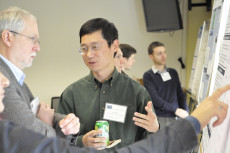
John Wu (middle foreground) and Richard Luis Martin (right background) presented posters at the meeting. David Brown, Computational Research Division director, is pictured on the left. (Photo: Margie Wylie)
On December 11, Berkeley Lab hosted Bay Area Scientific Computing Day (BASCD)—an annual one-day meeting to foster interactions and collaborations between researchers in the fields of scientific computing, computational science and engineering from the San Francisco Bay Area. More than 70 researchers across Northern California attended the meeting.

Richard Luis Martin of the Scientific Computing Group (at right) presented a poster explaining his work in porous materials screening. (Photo: Margie Wylie)
As meeting chair, Bert de Jong, leader of the Scientific Computing Group (SCG) in the Computational Research Division (CRD), joined Berkeley Lab Deputy Director Horst Simon in welcoming attendees to the meeting. Alexander Kemper and François-Henry Rouet, both SCG research scientists, participated in the BASCD program. Kemper presented his work on “numerical modeling of non-equilibrium phenomena and spectroscopy,” and Rouet talked about his work “using random butterfly transformations in a sparse direct solver."
A lunchtime poster session also gave a handful of attendees an opportunity to share their research. Alex Boyd of the Joint Genome Institute (JGI) and Kjiersten Fagnan of NERSC presented a poster on JAMO, a new metadata organizer and archive that streamlines JGI data management. John Wu of CRD’s Scientific Data Management Group (SDM) presented a poster on advanced machine learning algorithms for detecting anomalies in prices during the California electricity crisis of 2000 and 2001. Richard Luis Martin of CRD's SCG presented a poster that illustrates his work in computational screening techniques for porous materials which can be used in clean-energy applications, such as carbon capture.
Rachel Lance and Mocha Gardner provided administrative and logistical support for the meeting.
About Berkeley Lab
Founded in 1931 on the belief that the biggest scientific challenges are best addressed by teams, Lawrence Berkeley National Laboratory and its scientists have been recognized with 16 Nobel Prizes. Today, Berkeley Lab researchers develop sustainable energy and environmental solutions, create useful new materials, advance the frontiers of computing, and probe the mysteries of life, matter, and the universe. Scientists from around the world rely on the Lab’s facilities for their own discovery science. Berkeley Lab is a multiprogram national laboratory, managed by the University of California for the U.S. Department of Energy’s Office of Science.
DOE’s Office of Science is the single largest supporter of basic research in the physical sciences in the United States, and is working to address some of the most pressing challenges of our time. For more information, please visit energy.gov/science.









